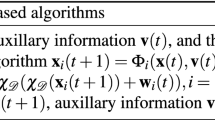Abstract
The pigeon-inspired optimization (PIO) algorithm is a newly presented swarm intelligence optimization algorithm inspired by the homing behavior of pigeons. Although PIO has demonstrated effectiveness and superiority in numerous fields, particularly in practical engineering optimization, there have been few results concerning the theoretical foundations of PIO. This paper conducts convergence analysis of basic PIO in a continuous search space in two aspects. First, we analyze the convergence of each pigeon’s expected position using a difference equation and prove that the average position of each pigeon in the swarm will converge to the same value. To further study the stochastic global convergence property of the pigeon swarm, we apply the martingale theory to investigate the basic PIO swarm sequence, and achieve a sufficient condition to guarantee global convergence of the basic PIO. Our theoretical analysis shows that this convergence depends upon the accumulation of the minimum probability with which the pigeon swarm jumps to the global-optimal region at each iteration. The mathematical methods proposed in this study, particularly the martingale technique, also provide a new effective approach for the theoretical analysis of bio-inspired algorithms in continuous optimization.
Similar content being viewed by others
References
Bonyadi M R, Michalewicz Z. Particle swarm optimization for single objective continuous space problems: a review. Evolary Comput, 2017, 25: 1–54
Dorigo M, Blum C. Ant colony optimization theory: a survey. Theor Comput Sci, 2005, 344: 243–278
Shi Y H. An optimization algorithm based on brainstorming process. Int J Swarm Intell Res, 2011, 2: 35–62
Duan H B, Qiao P X. Pigeon-inspired optimization: a new swarm intelligence optimizer for air robot path planning. Int J Intell Comput Cyber, 2014, 7: 24–37
Zhang B, Duan H B. Three-dimensional path planning for uninhabited combat aerial vehicle based on predator-prey pigeon-inspired optimization in dynamic environment. IEEE/ACM Trans Comput Biol Bioinf, 2017, 14: 97–107
Xu X B, Deng Y M. UAV power component-DC brushless motor design with merging adjacent-disturbances and integrated-dispatching pigeon-inspired optimization. IEEE Trans Magn, 2018, 54: 1–7
Duan H B, Li S T, Shi Y H. Predator-prey brain storm optimization for DC brushless motor. IEEE Trans Magn, 2013, 49: 5336–5340
Li T, Zhou C J, Wang B, et al. A hybrid algorithm based on artificial bee colony and pigeon inspired optimization for 3D protein structure prediction. J Bionanosci, 2018, 12: 100–108
Sushnigdha G, Joshi A. Trajectory design of re-entry vehicles using combined pigeon inspired optimization and orthogonal collocation method. IFAC-PapersOnLine, 2018, 51: 656–662
Xin L, Xian N. Biological object recognition approach using space variant resolution and pigeon-inspired optimization for UAV. Sci China Technol Sci, 2017, 60: 1577–1584
Rajendran S, Sankareswaran U M. A novel pigeon inspired optimization in ovarian cyst detection. Curr Med Imaging Rev, 2016, 12: 43–49
Lei X, Ding Y, Wu F X. Detecting protein complexes from DPINs by density based clustering with Pigeon-Inspired Optimization Algorithm. Sci China Inf Sci, 2016, 59: 070103
Duan H B, Ye F. Progresses in pigeon-inspired optimization algorithms. J Beijing Univ Technol (Nat Sci Ed), 2017, 43: 1–7
Xu G, Yu G S. On convergence analysis of particle swarm optimization algorithm. J Comput Appl Math, 2018, 333: 65–73
Liu Q F. Order-2 stability analysis of particle swarm optimization. Evolary Comput, 2015, 23: 187–216
Bonyadi M R, Michalewicz Z. Analysis of stability, local convergence, and transformation sensitivity of a variant of the particle swarm optimization algorithm. IEEE Trans Evol Comput, 2016, 20: 370–385
Nguyen H T, Wang T H. A Graduate Course in Probability and Statistics, Volume I, Essentials of Probability for Statistics. Beijing: Tsinghua University Press, 2008
Elaydi S N. An Introduction to Difference Equations. 3rd ed. New York: Springer, 2005
Rudolph G. Convergence properties of evolutionary algorithms. Dissertation for Ph.D. Degree. Hamburg: University of Hamburg, 1997
Rudolph G. Stochastic convergence. In: Handbook of Natural Computing. Berlin: Springer, 2010
Agapie A, Agapie M. Transition functions for evolutionary algorithms on continuous state-space. J Math Model Algor, 2007, 6: 297–315
Agapie A, Agapie M, Zbaganu G. Evolutionary algorithms for continuous-space optimisation. Int J Syst Sci, 2013, 44: 502–512
Agapie A, Agapie M, Rudolph G, et al. Convergence of evolutionary algorithms on the n-dimensional continuous space. IEEE Trans Cybern, 2013, 43: 1462–1472
Beyer H G. The Theory of Evolution Strategies. New York: Springer, 2001
Acknowledgements
This work was supported by Natural Science Foundation of China-Guangdong Joint Fund (Grant No. U1501254), National Natural Science Foundation of China (Grant Nos. 61772225, 61876207), Guangdong Natural Science Funds for Distinguished Young Scholar (Grant No. 2014A030306050), the Ministry of Education — China Mobile Research Funds (Grant No. MCM20160206), Guangdong High-level Personnel of Special Support Program (Grant No. 2014TQ01X664), International Cooperation Project of Guangzhou (Grant No. 201807010047), and Science and Technology Program of Guangzhou (Grant Nos. 201804010276, 201707010227, 201707010228).
Author information
Authors and Affiliations
Corresponding author
Rights and permissions
About this article
Cite this article
Zhang, Y., Huang, H., Wu, H. et al. Theoretical analysis of the convergence property of a basic pigeon-inspired optimizer in a continuous search space. Sci. China Inf. Sci. 62, 70207 (2019). https://doi.org/10.1007/s11432-018-9753-5
Received:
Accepted:
Published:
DOI: https://doi.org/10.1007/s11432-018-9753-5




